|
|
|
Sort Order |
|
|
|
Items / Page
|
|
|
|
|
|
|
| Srl | Item |
| 1 |
ID:
075737
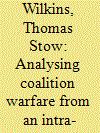

|
|
|
|
|
| Publication |
2006.
|
| Summary/Abstract |
This article sets forth a framework for analysis designed to enhance our understanding of the political management of coalition warfare. The framework, based upon literature appertaining to 'intra-alliance politics' and International Relations (IR) theories, is applied to the case study of the Normandy Campaign of 1944. Utilising this framework we are able to consider many of the thorny issues of coalition politics and determine how these can be managed successfully to maintain Allied cohesion. Throughout the analysis the merits of the 'realist' and 'pluralist' views on maintaining Allied cohesion are appraised. The article concludes that, while both afford convincing explanations for overcoming tensions within the coalition, the pluralist approach proves superior in accounting for Allied unity. Overall, the article demonstrates that the intra-alliance politics framework is a useful device for understanding the political dynamics of the Normandy Campaign in 1944 and that it is also potentially applicable to other instances of coalition warfare; past, present, and future.
|
|
|
|
|
|
|
|
|
|
|
|
|
|
|
|
| 2 |
ID:
075733
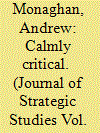

|
|
|
|
|
| Summary/Abstract |
Russia has consistently opposed US hegemony since the early 1990s. Moscow has sought to create a world overseen by the UN Security Council and several power centres supporting an anti-hegemonic axis. Until recently, Russia's resources have been very limited. Russian opposition therefore was largely conceptual or a work in progress. Russian policy was largely reactive - and non-confrontational. However, the failure of the Russia-US relationship to develop practically has highlighted negative views of US hegemony, and the greater wealth generated through high energy prices is supporting an increasingly active Russian policy.
|
|
|
|
|
|
|
|
|
|
|
|
|
|
|
|
| 3 |
ID:
075735
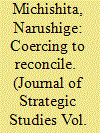

|
|
|
|
|
| Publication |
2006.
|
| Summary/Abstract |
Since 1993 North Korea's response to US 'hegemony' has been a seemingly paradoxical attempt to bandwagon with the United States by means of military coercion. However, after more than a decade of effort, North Korea has failed to normalize its relations with the United States. In the years ahead, it can either pursue more proactively the strategy of bandwagoning with the United States, shift its strategic focus to China, or embark upon a policy of equidistance between the United States and Japan on the one hand and China on the other.
|
|
|
|
|
|
|
|
|
|
|
|
|
|
|
|
| 4 |
ID:
075734
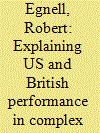

|
|
|
|
|
| Publication |
2006.
|
| Summary/Abstract |
A nation's structure and culture of civil-military relations are important and largely overlooked factors in explaining the performance of armed forces involved in complex expeditionary operations. The US model of 'Huntingtonian', divided civil-military structures and poor interagency cooperation, makes the US military less suited for complex expeditionary operations. British civil-military relations involve a Defence Ministry that conscientiously integrates military and civilian personnel, as well as extensive interagency cooperation and coordination. This 'Janowitzean', integrated form of civil-military relations makes the British military more likely to provide for the planning and implementation of comprehensive campaigns that employ and coordinate all instruments of power available to the state, as well as troops in the field displaying the flexibility and cultural and political understanding that are necessary in complex expeditionary operations.
|
|
|
|
|
|
|
|
|
|
|
|
|
|
|
|
| 5 |
ID:
075732
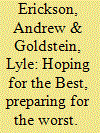

|
|
|
|
|
| Publication |
2006.
|
| Summary/Abstract |
In the post-Cold War strategic environment, Beijing could plausibly have opted for Soviet-style geostrategic competition with Washington, but it has not. Chinese leaders have not thus far, and almost certainly will never, amass thousands of nuclear weapons on hair-trigger alert or deploy significant forces to a network of bases spanning the globe. Nevertheless, the below assessment of China's increasing hard and soft power yields the conclusion that a Chinese challenge to US hegemony cannot be ruled out. The United States must prudently maintain military forces appropriate to facing a potential peer competitor. At the same time, however, Washington must engage in a process of creative diplomacy that simultaneously matches China's soft power and engages seriously with Beijing to create areas of consensus and cooperation.
|
|
|
|
|
|
|
|
|
|
|
|
|
|
|
|
| 6 |
ID:
075736
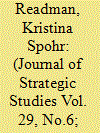

|
|
|
|
|
| Publication |
2006.
|
| Summary/Abstract |
Based on newly released documents from the German foreign ministry archives, this article investigates Bonn's goals, strategies and negotiation tactics at the Conference on Security and Development in Europe (CSCE). By focusing in particular on the multilateral preparatory talks in 1972/73 when the general Conference framework was negotiated and national and alliance positions were determined, it will be shown that (1) the Federal Republic of Germany was the key Western player at the CSCE, and (2) its policies were largely driven by national, Deutschlandpolitik interests - although on the surface the emphasis was always on a multilateral approach and a united Western (EPC/NATO) position. Furthermore, this article will reveal the significance of the 'politics of language' in West German diplomacy; and offer some wider reflections on the importance of language and its symbolism in international relations.
|
|
|
|
|
|
|
|
|
|
|
|
|
|
|
|
|
|
|
|
|